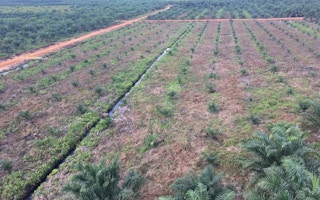Two large palm oil companies have quit a voluntary framework set up to help forest-risk companies meet their no-deforestation pledges.
To continue reading, subscribe to Eco‑Business.
There's something for everyone. We offer a range of subscription plans.
- Access our stories and receive our Insights Weekly newsletter with the free EB Member plan.
- Unlock unlimited access to our content and archive with EB Circle.
- Publish your content with EB Premium.
Golden Agri-Resources (GAR), a large palm oil company owned by Indonesian conglomerate Sinar Mas, and IOI Group, a Malaysian competitor, have withdrawn from the High Carbon Stock Approach (HCSA), bringing the tally of palm oil companies quitting HCSA to four in three years.
Wilmar International, the world’s biggest palm oil firm, resigned citing governance issues in 2020. Sime Darby Plantation, the market leader for selling certified sustainable palm oil, left in the same year, blaming Covid 19-induced budget constraints.
Environmental groups say that by leaving HCSA these companies are shirking their responsibility to report transparently on progress to meet sustainability commitments.
Netherlands-headquartered HCSA was established in 2014 to provide companies in the palm oil and pulp and paper sectors with a methodology that distinguishes areas that can be developed from those that should be protected because of their high conservation value.
“
We question now whether GAR is serious about implementing its no-deforestation commitments and contributing to the reform of the palm oil sector.
Grant Rosoman, senior campaign advisor, Greenpeace International
Grant Rosoman, senior campaign advisor for Greenpeace, which co-chairs HCSA, said he was not concerned about the future of the organisation “for now”, as members joining and leaving was normal.
HCSA is transitioning to a new business model less reliant on membership fees, he said. The bigger issue is engagement to maintain the HCSA toolkit, which is a primary role of members.
He added that leaving voluntary initiatives like HCSA invited regulatory approaches to control tropical forest loss, such as the European Union’s recently enacted deforestation law.
Companies quitting voluntary schemes “undermine being able to use voluntary measures as evidence towards meeting legal and regulatory requirements,” he said.
Leaving HCSA
IOI has not responded to queries about why it left the standards body.
GAR said in a statement that it had seen a “shifting focus” from HCSA in enforcing its guidance in recent years, and an “unnecessary” overlapping role between HCSA and the Roundtable on Sustainable Palm Oil (RSPO), a sustainably-grown oil palm certifier.
The Singapore-based company said that despite its resignation from the body, it was committed to its zero-deforestation policy and would abide by the HCSA’s toolkit. GAR was one of the founding members of HCSA and helped to develop the methodology.
Rosoman said GAR’s exit signalled a weakening of its no deforestation, no peatland and no exploitation (NDPE) commitment and suggested the company was ducking its responsibility to report on progress to protect forests in its concessions.
GAR made a NDPE pledge after campaigning by Greenpeace highlighted the bulldozing of Indonesian forests by the Sinar Mas-owned company. HCSA members are required to report their progress in implementing commitments to stop tree-cutting.
Greenpeace partnered with GAR to develop the HCSA toolkit but broke ties in 2018 after GAR was found to have violated HCSA requirements by clearing around 1,000 hectares of high-carbon forests in Liberia through its subsidiary Golden Veroleum Liberia (GVL).
Rosoman said Greenpeace is concerned that by stepping back, GAR will not follow through with agreed forest restoration and social remediation in Liberia.
Anita Neville, GAR’s communications and sustainability chief, said the company has made it clear that it will continue to require GVL to meet the requirements of both the HCSA and RSPO complaints processes.
“We do believe it is in the interests of all parties to have a single process. And given that the RSPO process precedes the HCSA complaint we believe it should be the pre-eminent vehicle for resolution of the GVL matter,” she said.
Neville added that GAR, with Wilmar, had pushed for the HCSA methodology to be central to the palm roadmap launched at the COP27 climate talks in November. “These actions seem at odds with Greenpeace’s false claims that we are abandoning our commitment to no-deforestation,” she told Eco-Business.
Rosoman said he suspected that IOI Group, which made a NDPE commitment in 2017, “also does not like the transparency and reporting requirements of HCSA.”
A year before IOI made a commitment to stop clearing forests, the Kuala Lumpur-headquartered firm was suspended from RSPO for developing peatlands in Kalimantan, Indonesia. The firm’s customers, including consumer goods firms Unilever, Mars and Nestlé, cancelled contracts as a result.
Danielle van Oijen, international forest campaigner at Milieudefensie, the Dutch non-profit that co-filed the HCSA complaint against GAR, said: “Over and over again we see companies use voluntary mechanisms [like HCSA] to greenwash their image and use that to get access to finance and sensitive markets. But when it gets too hot under their feet, they just step away with no consequences.”
“We have been pleading for decades for binding regulations to hold forest destroyers to account. Companies like GAR should not have access to finance or bring their produce on the market unless they repair the damage done and prevent further adverse impacts,” she said.








